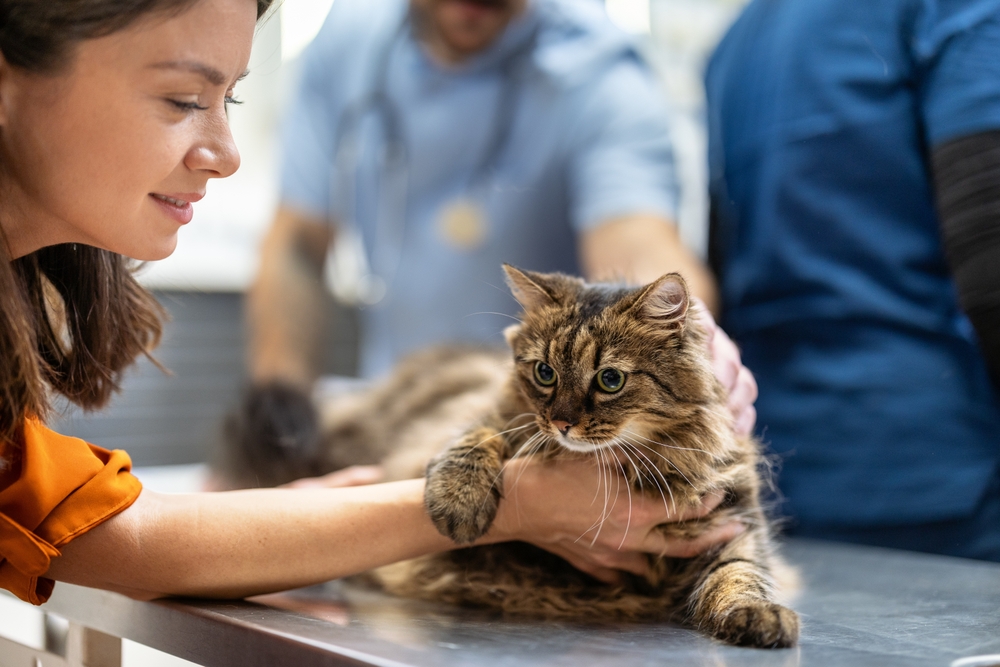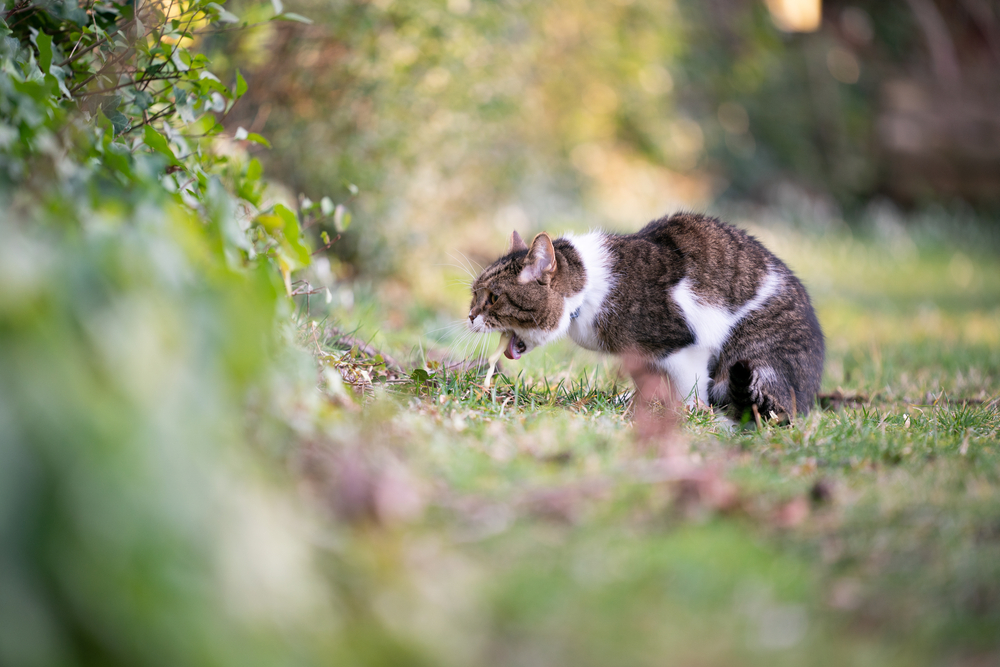Cat Throwing Up? Here’s What Your Vet Wants You to Know
If you’ve ever heard that unmistakable sound of your cat gearing up to vomit, you know the sinking feeling that follows. Is it just a hairball- or something more?
At Tamberly Animal Hospital, we know that vomiting in cats is one of the most common reasons owners bring their pets in for care. But not all vomiting is created equal, and knowing the difference between a one-off episode and a potential red flag can make all the difference. Let’s break down the most common causes of vomiting in cats, what you can do at home, and when it’s time to get help.
Vomiting vs. Regurgitation: Not the Same Thing
First, let’s clear up a common mix-up. Vomiting is an active process. It usually comes with heaving, gagging, and abdominal effort, and the result is partially digested food- or worse. Regurgitation, on the other hand, is more passive. It happens without warning, usually soon after eating, and the food looks barely touched. This distinction matters because it helps us narrow down the potential causes and choose the right diagnostic path.
Occasional Vomiting vs. Concerning Symptoms
It’s not unusual for cats to vomit occasionally. Hairballs, minor dietary indiscretions, or even excitement can cause a temporary upset. However, vomiting should not be dismissed if it:
- Happens more than once in 24 hours
- Becomes a regular weekly occurrence
- Is accompanied by lethargy, diarrhea, or appetite loss
- Contains blood or bile
- Involves a sudden refusal to eat or drink
Vomiting is a symptom- not a disease- and it can signal anything from minor digestive irritation to major internal issues.
Common Causes of Vomiting in Cats
Hairballs and Grooming Habits
Cats are meticulous groomers, and in the process, they ingest loose fur. Most of this passes through the digestive tract, but sometimes it forms clumps (hairballs) that trigger vomiting. While occasional hairballs are expected, frequent vomiting of hairballs may point to overgrooming, skin issues, or digestive inefficiencies.
Sudden Dietary Changes
Abrupt changes in food or introducing a new treat can irritate a cat’s stomach. Gradual food transitions and high-quality diets can prevent vomiting caused by dietary intolerance or sensitivity.
Foreign Body Ingestion
Cats, especially playful or curious ones, may ingest string, ribbon, plastic, or small toys. These foreign objects can obstruct the gastrointestinal tract, causing repeated vomiting, discomfort, or even collapse. In such cases, surgery may be required. The American College of Veterinary Surgeons provides insight into how these cases are diagnosed and treated.
Parasites
Worms and other intestinal parasites can trigger chronic vomiting and digestive upset. Routine deworming and fecal testing are essential, especially in younger cats.
Chronic Conditions
Several serious diseases include vomiting as a primary symptom:
- Chronic kidney disease (CKD) is one of the most common causes of vomiting in senior cats. As the kidneys fail, toxins build up in the blood and affect the digestive system.
- Hyperthyroidism leads to increased metabolism, which can disrupt digestion. AAHA guidelines recommend regular thyroid testing in senior cats to catch it early.
- Pancreatitis can cause nausea, vomiting, and abdominal pain. It’s often difficult to diagnose without blood tests and imaging. Read about how pancreatitis in pets is managed in veterinary practice.
- Hepatic lipidosis (fatty liver disease) occurs when cats stop eating, leading to liver dysfunction and vomiting. Prompt care is critical. More about this disease is available from Cornell’s feline health center.
Other Causes to Consider
Toxins and Poisonous Plants
Many household items- like lilies, essential oils, and certain human foods- can cause acute vomiting. Review the ASPCA list of toxic and non-toxic plants to protect your home environment.
Food Contamination
Stale or contaminated food can cause digestive upset. The CDC’s pet food safety guide outlines how to store and handle pet food properly.
Stress and Anxiety
Major changes in the household or environment can trigger vomiting, especially in sensitive or senior cats. Tamberly’s environment is designed to reduce stress during veterinary visits and improve outcomes.
How Tamberly Animal Hospital Can Help
At Tamberly Animal Hospital, we take every case of vomiting seriously- whether your cat is a curious kitten or a senior in need of extra attention.
Advanced In-House Diagnostics
We offer a full suite of diagnostic tools including:
- Bloodwork (CBC, biochemistry, thyroid panels)
- Urinalysis and fecal exams
- Radiology and abdominal imaging
- Electrolyte and clotting tests
Learn more about our diagnostic services and how we use technology to support accurate diagnosis and treatment.
Compassionate, Personalized Care
Dr. Denise Melton and the team tailor every visit to your pet’s needs, focusing on comfort and calm. We understand that cats respond best when they feel safe and heard- and that’s exactly the environment we create.
When to Call the Vet Immediately
Contact Tamberly Animal Hospital if your cat:
- Has vomited multiple times in 24 hours
- Is not eating or drinking
- Shows signs of abdominal discomfort (hiding, crying, restlessness)
- Has blood in vomit
- Is a senior cat with increased vomiting
Emergency care is available during clinic hours for walk-in cases. For after-hours concerns, we work closely with local emergency centers to ensure continuity of care.

Supporting Your Cat at Home
If vomiting is mild and your cat is otherwise alert, you can:
- Withhold food for 6–8 hours (but not water)
- Offer small portions of a bland diet
- Return to their regular food after 24 hours if vomiting stops
- Avoid giving treats or table scraps
However, persistent or worsening symptoms always warrant a veterinary exam.
Prevention Through Wellness
- Schedule annual or semi-annual exams
- Keep up with parasite prevention
- Avoid sudden diet changes
- Monitor for early signs of disease
- Use high-quality food and maintain safe feeding practices
- Ensure a stress-reduced environment for sensitive or senior cats
Routine diagnostic screening helps catch conditions early, especially in senior cats who are more prone to systemic illness.
A Gentle Touch for Every Patient
Tamberly Animal Hospital blends advanced medicine with kind, compassionate care. Whether your cat is vomiting from a hairball or something more serious, we’re here to help them feel better- and help you feel supported every step of the way.
Call to Action
If your cat is vomiting more than usual or showing other signs of illness, contact us today.
(678) 459‑6001
Request an appointment online
Address: 980 Birmingham Rd Suite 301, Milton, GA 30004
Hours:
Mon–Tues, Wed, Fri: 8:30am – 6:00pm
Thurs: 8:30am – 2:00pm
1st and 3rd Saturday: 9:00am – 12:00pm
Your cat’s comfort, safety, and health matter. At Tamberly, we treat your pet like our own- because nothing less will do.







Leave A Comment